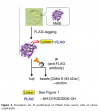How Compound 48/80 Regulates the Process of Apoptosis
In the field of life sciences research, apoptosis is a complex and intricate process that involves the self-destruction of cells and plays a crucial role in maintaining the normal physiological functions of organisms and the development of diseases. In recent years, compound 48/80 has garnered widespread attention in the scientific community due to its unique mechanisms in regulating apoptosis. This article will delve into how compound 48/80 regulates the process of apoptosis and reveal its potential applications in biomedical research.
Overview of Compound 48/80
Compound 48/80 (trihydrochloride) is a mixture of formaldehyde condensation products of N-methyl-p-methoxyphenylethylamine. Since its first report in 1951, it has attracted attention as an active histamine releaser. This compound can cause skin reddening, itching, and pruritus in humans, and was initially used to study pseudo-allergic reactions. Subsequently, scientists discovered that compound 48/80 is a classic mast cell activator dependent on IgE and G-protein, making it an important tool for studying mast cell function and allergic reactions.
The Relationship Between Compound 48/80 and Apoptosis
Apoptosis is a highly regulated process involving a series of complex molecular events that eventually lead to the orderly demise of cells. Recent studies have shown that compound 48/80 plays an important role in regulating apoptosis.
First, compound 48/80 can induce mast cell degranulation, a process accompanied by the release of various inflammatory mediators, including histamine (HIS), tumor necrosis factor TNF-α, and interleukin IL-8. These inflammatory mediators are not only involved in allergic reactions but are also closely related to the regulation of apoptosis. For example, HIS can bind to histamine receptors and activate a series of signaling pathways, ultimately affecting cell survival and death decisions.
Secondly, compound 48/80 has an inhibitory effect on the activity of cell membranes and particulate phosphatidylinositol-specific phospholipase C (PLC). PLC plays a key role in cell signal transduction. It can hydrolyze phosphatidylinositol to generate second messenger molecules such as inositol trisphosphate (IP3) and diacylglycerol (DAG), which in turn activate signaling molecules like protein kinase C (PKC) that regulate cell proliferation, differentiation, and apoptosis. The inhibitory effect of compound 48/80 on PLC may alter the balance of intracellular signal transduction, thereby affecting the process of apoptosis.
Additionally, compound 48/80 can inhibit ADP and PAF-ether-induced human platelet aggregation. Platelet aggregation is closely related to thrombosis and inflammatory responses, which in turn have complex interactions with apoptosis. Therefore, the inhibitory effect of compound 48/80 on platelet aggregation may indirectly affect the regulation of apoptosis.
Applications of Compound 48/80 in Biomedical Research
As a leading global supplier of high-performance life science products, Glpbio is committed to providing comprehensive research materials and reliable product performance for biomedical research. Glpbio's compound 48/80, with its good purity, stability, and bioactivity, has become an important tool for scientists to study apoptosis and allergic reactions.
In the field of neuroscience, compound 48/80 is used to study the interactions between mast cells and neurons, and how these interactions affect the survival and death of neurons. Studies have shown that inflammatory mediators released by mast cells can influence the excitability of neurons, thereby regulating the apoptosis process of neurons. This finding provides new insights for the study of neurodegenerative diseases.
In the field of cancer research, compound 48/80 is also used to explore the interactions between mast cells and tumor cells. Mast cell infiltration is a significant feature of the microenvironment of various tumors, and inflammatory mediators released by mast cells can promote the proliferation and migration of tumor cells and may also affect the apoptosis of tumor cells. Hence, compound 48/80 has become an important tool for studying the functions of mast cells in the tumor microenvironment.
Moreover, compound 48/80 plays an important role in the fields of anti-infection and epigenetics. In the research of infectious diseases, compound 48/80 is used to explore the role of mast cells in host defense and how they affect the survival and proliferation of pathogens. In epigenetics, compound 48/80 is used to study how inflammatory mediators influence gene expression and regulation, unveiling the epigenetic mechanisms of inflammation and disease development.
In conclusion, compound 48/80, as an important bioactive molecule, demonstrates unique mechanisms in the regulation of apoptosis. It affects the balance of intracellular signal transduction through various means, such as inducing mast cell degranulation, inhibiting PLC activity, and inhibiting platelet aggregation, thereby regulating cell survival and death decisions. In biomedical research, compound 48/80 has become an important tool in studying apoptosis, allergic reactions, neuroscience, cancer, anti-infection, and epigenetics. As a leading global supplier of high-performance life science products, Glpbio will continue to provide high-quality compound 48/80 and other life science research reagents, offering comprehensive research materials and reliable product performance to help scientists achieve significant scientific discoveries faster.












Comments